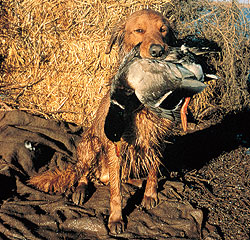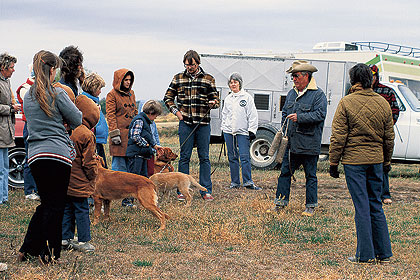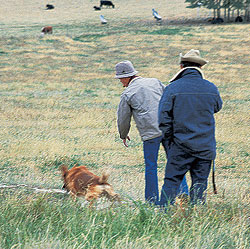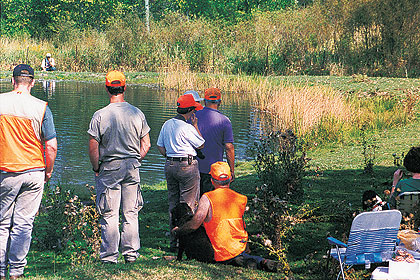Keep training during the off-season to stay sharp.
By James B. Spencer
 He did great this year in the marshes. Whether he will do better or worse next year depends on what you do between now and then. |
The 2009 hunting season isn't quite over, so the 2010 season is still many months off.
But when it finally arrives, will your retriever be better or worse? It's almost impossible that he'll be the same. Training a retriever is like riding a bicycle: You can't remain stationary; if you keep pedaling, you keep going forward; but if you stop pedaling, you slow down, eventually stop, tip over, and fall.
In retriever training, you keep "pedaling" by training regularly through the off-season. So how can you make sure that you will do that?
Setting Goals
We humans are goal-oriented. We won't long persist in any activity unless we feel we're making reasonable progress toward some desirable goal. If you were to make a new year's resolution to train your retriever, say, three evenings a week, without setting specific training goals that are important to you, you probably wouldn't hang in there for more than a month.
You might not even start. But if you say, "I'm going to train Blackie three evenings a week to help him master any test the judges might throw at him in the middle level of hunt tests," you would be setting a goal that would keep you coming back three times a week all summer long, and maybe even much longer.
To help you persevere, your goals must be not only important to you but also achievable.
Setting impossible goals will only discourage you and induce you to give up.
 Pro trainers offer group classes to teach people how to train their own dogs. |
If you set as your goal, say, the field champion title, you won't persevere without certain prerequisites: You must be a highly competitive person; you must be able to make substantial time and money commitments every year for several years; you must have a retriever capable of being trained to that level; and you must be able to endure a seemingly endless string of "purt' near but not plum" failures (not unlike the second best hand in a poker game) on your way to that title. Very few retrieverites have all those qualifications.
If you aren't sure what goals are possible for you in your current circumstances, you should attend several hunt tests (AKC hunting tests and UKC hunts), preferably with a knowledgeable friend who can help you to understand more fully what you observe. To find these tests, check the websites of AKC (www.akc.org) and UKC (www.ukcdogs.com).
Both AKC and UKC tests have three graduated testing levels. The lowest level (AKC "junior" and UKC "started") requires only single marks on land and in water. The middle level (AKC "senior" and UKC "seasoned") requires double marks and single blinds on land and in water. The highest level (AKC "master" and UKC "finished") requires triple marks and double blinds on land and in water.
When you attend a test, study the work of dogs at all three levels, but concentrate mostly on the middle level. Dogs that succeed there make ideal journeyman hunting companions.
 Some pro trainers offer one-on-one training classes to address the specific needs of one owner/dog team. |
If you feel your retriever is already at or beyond this level, you might consider running him in a hunt test or two to make sure you're correct. Somehow, these tests look much more difficult when you're at the line with your dog beside you than they do when you're a spectator in the gallery.
After attending a few hunt tests, you'll find it much easier to set specific goals for your dog, whether or not you ever run him in these events. That said, I must add that realizing that you will "go public" with your dog's training in these tests can be a powerful motivator to keep you training regularly.
An Assessment of Your Retriever
Next, you need to solicit an expert opinion on whether your Goldilocks has what it takes to succeed in the goals you are considering. If you have a friend who has been training retrievers for some reasonable number of years, a friend whose judgment you trust, you should ask him for his honest opinion.
Lacking such a friend, you should seek the opinion of a competent professional retriever trainer -- and expect to pay him for this service. How do you find a pro? You can find several at each hunt test; your local retriever club can probably recommend one or more; your veterinarian may know a few; or you can check the website of the Professional Retriever Trainers Association (www.prta.net). If possible, get contact information for two or three pros, talk to each one, get and check out references. Then choose one pro.
If you get a negative assessment from a competent person (amateur or pro) about your retriever's potential, you can either lower your sights or get another dog. It's that brutally simple.
If you get a positive assessment, you can start planning your training program.
The Requirements
First, you need to know what it will take to bring Dead-Grass up to the level you have set for him.
Perhaps the most crucial question is: How much of your time will it take? You especially need to know how often per week will you have to train your retriever to have a reasonable hope of success. Whoever evaluated your dog can give you general guidelines.
Then you need to be honest with yourself about whether you can devote that much time to retriever training. Many people today simply don't have much spare time. Some have jobs that require frequent trips out of town, sometimes for extended periods. Some have family obligations that take up much of their free time.
Others are too involved with other recreational activities: fishing, swimming, golf, tennis, coaching little league, and so on. Still others have busy social lives that occupy most of their evenings and weekends. If you are in any such situa
tion, you won't be able to devote the time retriever training takes. If that is the case, you should consider having a pro trainer train your retriever.
Another question: What equipment will you need (beyond the basics like whistles, leads, dummies, shotgun, blank pistol, and perhaps an e-collar)? If you can join a suitable training group, in which the members take turns shooting and throwing for one another, you won't need much other equipment. But if you must train mostly alone, you'll need remote dummy launchers, which are quite expensive.
 To make your training sessions productive, you should join a training group. |
Still another question: Can you gain access to suitable training grounds? You'll need three or four different areas in which to train. A dog trained in just one place will not generalize his training enough to perform well elsewhere. The easiest way to acquire multiple training areas is to join multiple retriever clubs, each of which has at least one plot of land leased for training. Then, too, you can probably train on some areas of public grounds in your area.
A final question: Do you have the knowledge required to train your retriever to the level you have selected, or can you get the regular assistance of someone who has this knowledge? Here again, joining a suitably knowledgeable training group will help you immensely.
A Shortcut
If you have adequate time for training, you can solve all the other problems (equipment, training grounds, and knowledge) by enrolling in a class conducted by a pro trainer.
During class periods, you get to use his equipment and training grounds, and he teaches you how to train your own retriever. Between class sessions, he may let you use at least his grounds at specified times.
Like pros in other sports (golf, tennis, bowling, whatever), most retriever pros offer both group and individual classes.
In group classes, if the pro has many students, he might separate them by training level: beginning dogs in one class, intermediate dogs in another, advanced dogs in still another, with the different classes meeting at different times.
If he has only a few students, he might put them all in the same class and work each dog at its own level (the old one-room school house approach).
In the individual classes, the pro works one-on-one with an owner/dog team and devotes the entire session to that specific team's needs.
If such classes appeal to you, you might consider starting out with a group class, which will meet once a week for several weeks. After completing that class (at whatever level your dog requires), if you still have some summer left, you might continue in the next higher level class.
Or you might take a series of individual classes to focus on your dog's specific needs right before hunting season.
Nota Bene: Jim Spencer's books can be ordered from the Gun Dog Bookshelf: Training Retrievers for Marshes & Meadows; Retriever Training Tests; Retriever Training Drills for Marking; Retriever Training Drills for Blind Retrieves; Retriever Hunt Tests; HUP! Training Flushing Spaniels the American Way; and POINT! Training the All-Seasons Bird Dog.






